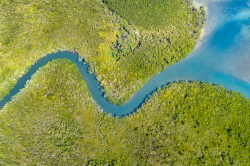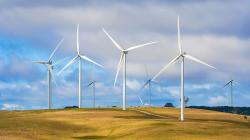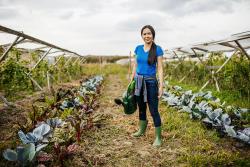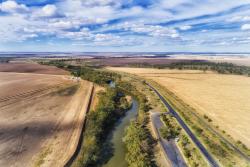Growing finance sector capacity for sustainability.
We work with financial system participants – banks, insurance, super funds, investors, regulators, government and the community – to advance sustainability, prosperity and wellbeing through sustainable finance and investment. We deliver bespoke research services and are working in partnership with financial system stakeholders to establish a sustainable finance learning ecosystem to meet the learning needs of the Australian financial system.
PROJECT | 2024
Drivers of change: meeting the energy and data demands of AI adoption in Australia and New Zealand
Uncertain about the impact of AI on energy consumption? Turns out that so too are IT managers who are key to AI deployment.
PROJECT | 2023
Scaling Green Retrofit Housing Finance
The Institute for Sustainable Futures (ISF) has proposed a “regulatory nudge” to unlock financing for green retrofits for low-income earners. With energy prices spiking, householders that wish to make green retrofits to their homes but don’t have access to spare cash risk being exposed to an unfair “net zero poverty premium”.
PROJECT | 2022
Corporate Sustainability Review for responsible investor
In 2022, ISF undertook research and review of the sustainability positioning and journey of a large Australian corporation on behalf of a group of responsible investors. Reflections were made on the overall sustainability governance and topics ranging from climate change, circular economy, and nature-related issues to diversity and inclusion. The researchers provided a report to the investors that summarised the company’s progress in its sustainability journey over the past five years, the most significant issues outstanding and engagement priorities for addressing the issues.
PROJECT | 2022
Advancing climate skills in the Australian financial system
A nation-wide survey of Australia's finance system identifies crucial skills gaps for supporting the transition to net zero and figuring climate change into planning. The results are distilled in an ISF report that includes recommendations for addressing this problem and developing a sustainable finance learning ecosystem.
View more projects
PROJECT | 2021-2022
NSW Circular Rapid Review Reports
UTS Institute for Sustainable Futures leads NSW Circular Rapid Review research
PROJECT | 2020-2021
The use of climate scenarios in Australia
How can climate scenarios help to evaluate the risks and opportunities organisations will face with impending changes to our climate?
PROJECT | 2020
Climate Measurement Standards Initiative
Guidance for banks, insurers and asset owners for assessing climate-related physical risk.
PROJECT | 2019
Unlocking Australia’s sustainable finance potential
Applying the EU’s Action Plan on Sustainable Finance to an Australian context to guide greening the economy.
NEWS | December 2020
Climate change and the just transition: A guide for financial institutions
What role will financial institutions and corporate entities play in ensuring Australia’s move to clean energy is ethically handled?
NEWS | December 2020
Sectoral Pathways to Net Zero
ISF has modelled pathways for industries to take towards the Paris Agreement goal of net-zero. The Net-Zero Asset Owner Alliance (NZAOA) is an international group of institutional investors, representing more than USD 4.
PROJECT | 2020-2021
Task Force on Climate-related Financial Disclosures analysis for Port of Newcastle
The Port of Newcastle is the largest port on the east coast of Australia and has been a global trade gateway for more than 220 years. ISF was commissioned by the Port of Newcastle to conduct Task Force on Climate-related Financial Disclosures scenario analysis of climate-related risk.
Our research sought to define climate change impacts both on he Port of Newcastle's physical infrastructure and supply chains (through market and technological shifts as well as physical impacts such as drought), applicable policy and legislation and reputation. The research helped our client to initially understand what the potential implications might be, so that they could work to develop mitigation measures and ensure delivery of a resilient asset to their investors.
PROJECT | 2019-2020
Evaluation of ARENA’s Renewable Energy Venture Capital Fund Program
The Australian Renewable Energy Agency (ARENA)’s Renewable Energy Venture Capital Fund Program was designed to support the development of renewable energy and enabling technologies in Australia by providing venture capital and active investment management. In 2012, the Southern Cross Renewable Energy Fund was established under the program, as a co-investment with Softbank China Venture Capital. Over seven years, this fund invested more than $72 million in 12 energy start-ups.
ISF evaluated the performance, management and impact of the Renewable Energy Venture Capital Fund Program, including the Southern Cross Renewable Energy Fund and its portfolio of investments. Report findings and recommendations have influenced the ongoing management of this program and management of future programs.
Client: Australian Renewable Energy Agency (ARENA)
Researchers: Alison Atherton, Kriti Nagrath, Joanne Chong, Chris Briggs
PROJECT | 2018-2019
Climate information needs for the financial, insurance, investment and innovation sectors
Preparing to meet the challenges posed by climate change is crucial to the future of many industries, and it's vital that they are supported by relevant and accessible information to help guide their way forward.
In 2018, Climate KIC and the NSW Office of Environment and Heritage Renewable Energy Precincts Program asked ISF researchers to help them understand how people in the finance, insurance, business and innovation sectors use available information about the physical impacts of climate change.
To know more, our researchers completed a comprehensive desktop literature review and conducted stakeholder surveys over the course of a year. Their findings showed our clients what kind of information was helpful to these sectors and what information would be most helpful to these sectors in the future.
Clients: Climate KIC, NSW Office of Environment and Heritage Renewable Energy Precincts Program
PROJECT | 2018-2019
Climate information needs for the small and medium enterprise sector
Preparing to meet the challenges posed by climate change is crucial to the future of many industries, and it's vital that they are supported by relevant and accessible information to help guide their way forward.
In 2018, the NSW Department of Planning, Industry and Environment asked ISF researchers to help them gauge awareness of climate drivers at an organisational level, and to understand how organisations engage with available information about the impacts of climate change.
To know more, our researchers completed a comprehensive desktop literature review and conducted stakeholder surveys over the course of a year. Their findings showed our client what kind of information was helpful to these sectors and what information they would need in the future.
Client: NSW Department of Planning, Industry and Environment
Researchers: Samantha Sharpe, Brent Jacobs, Rebecca Cunningham
PROJECT | 2018
Assessing the social impact investment market in Australia
In partnership with UTS Business School and the Responsible Investment Association Australasia, ISF delivered a research project for the Australian Government Department of Social Services, assessing the social impact investment market in Australia. The research examined how to grow the financial and non-financial evidence base of social impact investment and explored the benefits, frequency, content and format of information sharing and data needs of the Australian social impact investment market. The project delivered a research report with recommendations for the Australian Government to contribute to growing the evidence base for social impact investment in Australia, and a literature review.
Client: Australian Government Department of Social Services (DSS)
PROJECT | 2018
Climate information needs in the business and finance sector
ISF partnered with Climate-KIC to complete a climate needs analysis for the business, finance, insurance and innovation sectors. This is an extension of project work under the Regional Innovation Systems theme in the Adaptive Communities Hub.
Client: Climate KIC
Researcher: Samantha Sharpe
PROJECT | 2018
Funding the transition to 100% renewables with Australia's retirement savings
Future Super – Australia’s first ethical, diversified super fund with a portfolio that completely excludes fossil fuels – commissioned ISF to update the 2018 report, Supercharging Australia's Clean Energy Transition.
The report was a succinct, graphical, and easy-to-understand research paper – supported by robust modelling – that brought together the Advanced Renewables investment case in ISF's '100% renewables in Australia' research from 2016 with data modelling the size of Australia's retirement sector into the future.
The aim of this new research project was to calculate if the previous headline figure (7.7 per cent of Australia's super fund would be required to achieve power sector decarbonisation by 2030, and 12.4 per cent would be required to achieve full energy sector decarbonisation by 2050) has changed and if so, why?
Client: Future Superannuation Group Pty Ltd
Researchers: Yohan Kim, Scott Dwyer, Scott Kelly
PROJECT | 2018
Supercharging Australia’s clean energy transition
How just 7.7 per cent of superannuation could fund Australia’s transition to 100% renewable energy by 2030.
PROJECT | 2016-2020
Assessing corporate sustainability for investors
ISF's ongoing partnership with an international investor group results in research that influences ethical investment.
PROJECT | 2016-2019, 2018-2020
Financing peri-urban agriculture: conceptual development and review of the Agricultural Enterprise Credit scheme
Our research supported the case for a world-leading reward scheme for urban food production.
PROJECT | 2016-2017
Water scarcity risk for Australian farms and the implications for the financial sector
ISF partnered with AgTech company The Yield to come up with a new method for calculating the water risk exposure for farms.
PROJECT | 2014-2015
Investigating financing options for residential energy efficiency
The NSW government, through the Office of Environment and Heritage, has an Energy Efficiency Action Plan that includes an aim to make finance for residential energy efficiency more affordable and accessible. To support this aim, ISF investigated financing options for residential energy efficiency measures.
The project involved a literature review to determine barriers to energy efficiency; a desktop market scan of available finance products including analysis of the supply and demand gaps; and stakeholder interviews with companies offering green finance products, organisations working on Environmental Upgrade Agreements and providers of energy efficiency services and products. The research concluded by identifying possible roles for the NSW Government in addressing the Energy Efficiency Action Plan.
Client: NSW Office of Environment and Heritage
Researchers: Kerryn Wilmot, Ed Langham, Christian Ege, Ben Madden, Caitlin McGee, Nicky Ison
PROJECT | 2013
Investing in savings: finance and cooperative approaches to electricity demand management
This scoping study examined the potential for the Clean Energy Finance Corporation to help reduce customer electricity bills and foster clean energy investment in Australia by supporting electricity network businesses to implement demand management.
The report concludes that the benefits of network demand management are likely to be significantly greater and realised more quickly if regulatory reform is complemented with a cooperative approach to performance targets, reporting and incentives.
Client: Clean Energy Finance Corporation (CEFC)
PROJECT | 2007
Addressing short-termism in the finance sector
Delivered by ISF and the UTS Business School, this research explored, through a literature review and focus groups, the key causes of, and solutions to, 'short-termism' (an excessive focus on short-term results at the expense of long-term interests) in relation to institutional investment.
The outputs of the project were a discussion paper on causes of short-termism, a discussion paper on solutions to short-termism, and an action plan for implementation by members of the investment community and stakeholders. The project identified the need for further research and an in-depth finance sector-led review. It also outlined immediate steps to begin the shift to long-termism, or thinking further into the future.
Clients: Total Environment Centre (TEC), Insurance Australia Group
Researchers: Alison Atherton, Roel Plant, James Lewis, Cynthia Mitchell, Alex Kazaglis




















